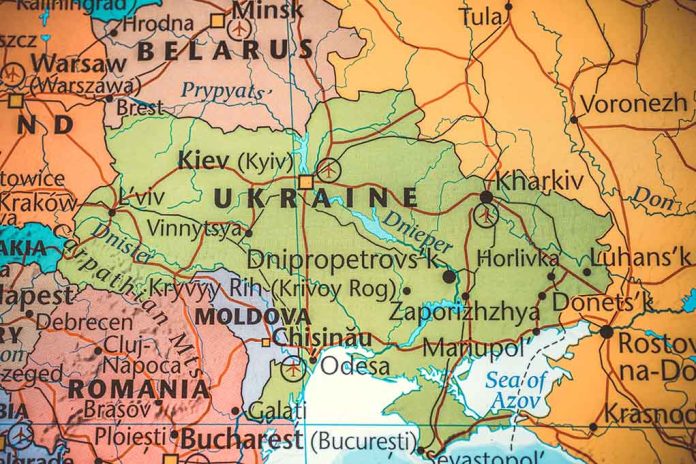
In the midst of diplomatic complexities, Ukrainian President Zelenskyy demands clarity in peace negotiations as Russian military actions persist.
Key Takeaways
- The Trump-Putin call discussed a “Contract for Peace,” yet military actions by Russia continue against Ukraine.
- Zelenskyy emphasizes Ukraine’s refusal to recognize occupied territories as Russian, marking them as a non-negotiable red line.
- A ceasefire is reported, but Russian strikes on Ukrainian infrastructure persist.
- Upcoming talks in Saudi Arabia are scheduled without Ukraine’s direct involvement.
- Zelenskyy plans to discuss the issue with Trump, asserting Ukraine’s role in the peace process is essential.
Zelenskyy’s Call for Clarity in Peace Dialogues
Following a conversation between U.S. President Donald Trump and Russian President Vladimir Putin, significant attention has turned to the peace negotiations concerning Ukraine. Ukrainian President Volodymyr Zelenskyy has reiterated the necessity for absolute clarity in any proposed peace processes. Russia’s continued military aggression against Ukraine has led Zelenskyy to declare that the acknowledgment of Russian territorial claims is off the table.
Zelenskyy’s remarks come after reports of a “very good” call between Trump and Putin, where they discussed a peace contract and ceasefire. Despite these discussions, Russian forces have launched further strikes on Ukrainian energy facilities, compelling Zelenskyy to question Russia’s commitment to a genuine ceasefire. Zelenskyy plans a conversation with Trump to detail Ukraine’s involvement in the negotiations.
Russia’s Ongoing Military Engagements
Despite a supposed ceasefire agreement mentioned by Trump and Putin, Russian military actions continue targeting Ukrainian infrastructure. Facilities, transport lines, and hospitals have been hit, indicating discrepancies between Russia’s verbal claims and its military actions. Ukrainian officials, including Zelenskyy, remain skeptical of any promise from Russia without tangible disengagement from military aggression.
“Even this night after Putin’s talk with President Trump, when Putin allegedly said he had given the order to stop strikes on the Ukrainian energy targets, 150 drones hit energy infrastructure, transport, unfortunately two hospitals,” Zelenskyy told reporters.
The Kremlin’s requirement for stopping Western military support to Ukraine before agreeing to a ceasefire has been criticized by Ukrainian and EU officials. Ukrainian President Zelenskyy outlined the country’s nonnegotiable red lines concerning sovereignty and recognized boundaries, adamantly rejecting the idea of ceding any territories like Crimea and Donbas to Russian control.
Future Negotiations and Global Responsibilities
Talks between the U.S. and Russia are anticipated to continue in Jeddah, Saudi Arabia, without Ukraine’s direct input, but with hopes of establishing a broader ceasefire. Mykhailo Podolyak, advisor to Zelenskyy, mentioned the necessity of capturing true intent behind Trump’s discussions with Putin. As the situation evolves, forthcoming negotiations in Saudi Arabia are under scrutiny as they address partial ceasefire implementations.
“I spoke today with my Russian counterpart Yuri Ushakov about President Trump’s efforts to end the war in Ukraine. We agreed our technical teams would meet in Riyadh in the coming days to focus on implementing and expanding the partial ceasefire President Trump secured from Russia,” said U.S. national security adviser Mike Waltz.
As the international community watches the developments, Ukraine stands firm in its pursuit of a fair and just resolution. The insistence on complete autonomy and lack of cession reflects the deep-seated values of Ukrainian independence and national integrity. As discussions roll out, the emphasis is placed on ensuring pragmatic outcomes supportive of Ukrainian sovereignty.





